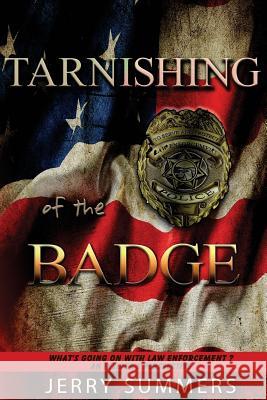Tarnishing of the Badge: What's Going on with Law Enforcement? An Insider's Perspective » książka
Tarnishing of the Badge: What's Going on with Law Enforcement? An Insider's Perspective
ISBN-13: 9781944577087 / Angielski / Miękka / 2016 / 74 str.
Tarnishing of the Badge: What's Going on with Law Enforcement? An Insider's Perspective
ISBN-13: 9781944577087 / Angielski / Miękka / 2016 / 74 str.
(netto: 26,34 VAT: 5%)
Najniższa cena z 30 dni: 27,81
ok. 16-18 dni roboczych
Bez gwarancji dostawy przed świętami
Darmowa dostawa!
Law enforcement in the United States is on the cusp of a crisis in regards to the public's trust and the industry's ability to self-police. Sensational headlines involving corruption, abuse of power, and police officer criminal misconduct continue to raise public concern. For the past five decades police officers, prosecutors, defense attorneys and judges have conducted business shrouded in a cloak of secrecy virtually unquestioned by anyone outside of the legal system. Yet in the wake of the prominent police shootings of Michael Brown, Alton Sterling, and Philando Castile the public is demanding explanations. In a system of justice where the public's trust is placed in the checks and balances established, the integrity of those involved is supposed to be above reproach. Ultimate trust is bestowed upon the police officers who enforce the laws, the attorneys who handle the case, and ultimately the courts who hear the case and pronounce judgment. Unfortunately, just a cursory review the United States Supreme Court records reveals this is a process with a systematic integrity problem bordering on complete moral failure. This is both preventable and unnecessary; if each component within the judicial system would conduct themselves with the highest of ethical standards and rigidly follow their respective ethical oaths. In a system where over ninety-seven percent of the cases are concluded without going to trial, it is critical to the process for those given such high standing to be above suspicion in their professional morals and integrity. Within this system, transparency is essential. It wouldn't matter whether the ethical failure or betrayal of the law enforcement Code of Ethics came from an individual officer, police administrator, or entire organization, because the way it is handled would be public record. The system was initially established to have: Police keep citizens safe from criminals; Prosecutors keep the citizens safe from overzealous police actions; Defense attorneys keep the accused safe from overzealous prosecutors; and Judges to insure these components followed the law Ultimately the courts, through judicial reviews, were to hold any wayward elements accountable for any violations of individual liberties. Yet, since the Brady versus Maryland decision in 1963, we have seen a systematic failure in that, according to the National Registry of Exonerations, 46% of the 1,576 people exonerated since 1989 were exonerated as a result of official misconduct. So, what are some possible solutions to minimize such occurrences from becoming an acceptable pattern in the American justice system? I suggest a three-pronged approach. First, prosecutors should be required to have an open file policy where all potential evidence must be disclosed to the defense, whether the prosecutor intends to use it or not. The same holds true for all potential witnesses. Second, the exemption for disclosure of personnel actions should be removed. That would allow the public the ability to judge for themselves whether proper management supervision is being exercised by the elected district or prosecuting attorney. Finally, remove absolute immunity for prosecutors, and have it follow the qualified immunity of police officers. This would open prosecutors up to civil liability for willful misconduct and gross negligence in the performance of their duties, thereby holding them accountable for their actions in and out of the courtroom. And finally, a Call to Action is provided, with information to reach out to legislators to make changes."











